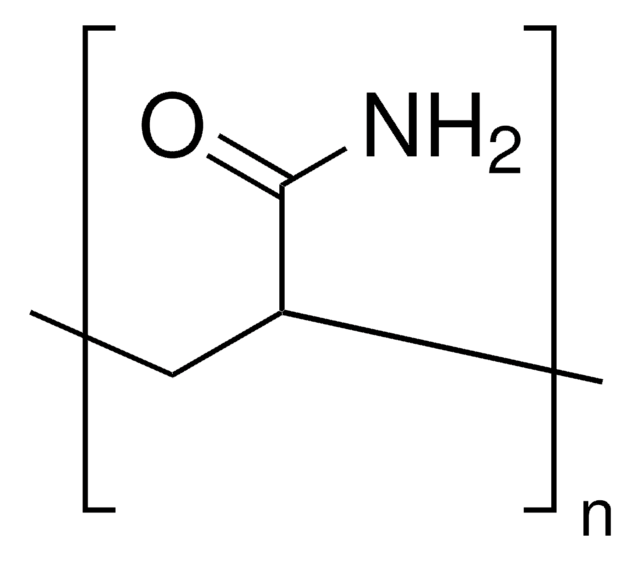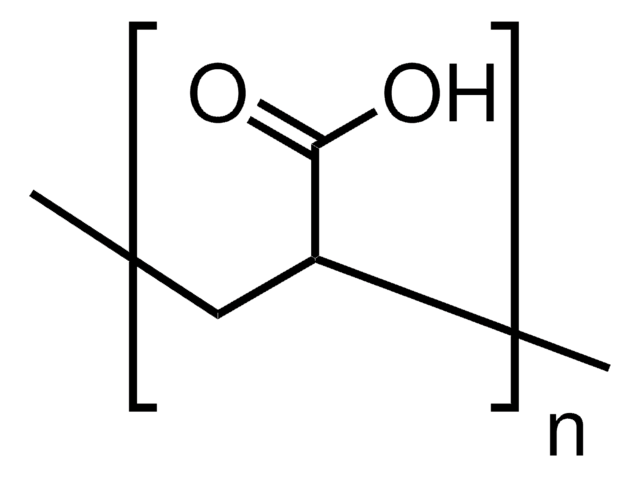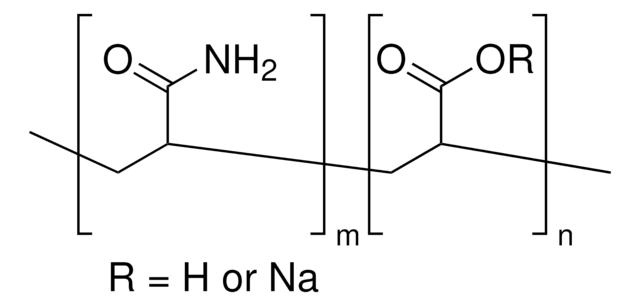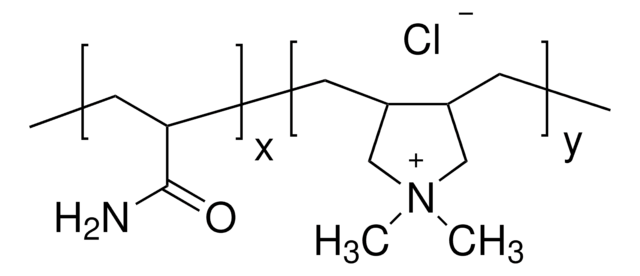92560
Polyacrylamide
nonionic water-soluble polymer
Sinónimos:
2-Propenamide, Acrylamide polymer, Polyacrylic
Iniciar sesiónpara Ver la Fijación de precios por contrato y de la organización
About This Item
Fórmula lineal:
(C3H5NO)n
Número de CAS:
Número MDL:
Código UNSPSC:
41105319
NACRES:
NA.28
Productos recomendados
Nivel de calidad
Formulario
solid
mol peso
Mw 5,000,000-6,000,000
mp
246-250 °C
InChI
1S/C3H5NO/c1-2-3(4)5/h2H,1H2,(H2,4,5)
Clave InChI
HRPVXLWXLXDGHG-UHFFFAOYSA-N
¿Está buscando productos similares? Visita Guía de comparación de productos
Aplicación
- Proteomic analysis and lethality of the venom of Aegaeobuthus nigrocinctus, a scorpion of medical significance in the Middle East.: This study explores the proteomic composition and toxicity of the venom from the Aegaeobuthus nigrocinctus scorpion, utilizing polyacrylamide gel electrophoresis to analyze venom proteins. The findings contribute to understanding the venom′s biochemical properties and potential medical implications (Borges et al., 2024).
- Protocol for isolating small cytosolic dsDNA from cultured murine cells.: This protocol paper details a method for isolating small cytosolic double-stranded DNA using polyacrylamide gel electrophoresis, which is critical for studying DNA-protein interactions and genetic regulation in murine cell models (Dai et al., 2024).
- Comparative study of the commonly used protein quantitation assays on different Hymenoptera venoms: A fundamental aspect of Hymenoptera venom proteome analysis.: This comparative study evaluates various protein quantitation assays, including those using polyacrylamide gel electrophoresis, to standardize venom protein analysis from different Hymenoptera species, aiding in venom research and potential therapeutic applications (Wanandy et al., 2024).
Código de clase de almacenamiento
11 - Combustible Solids
Clase de riesgo para el agua (WGK)
WGK 2
Punto de inflamabilidad (°F)
Not applicable
Punto de inflamabilidad (°C)
Not applicable
Equipo de protección personal
Eyeshields, Gloves, type N95 (US)
Elija entre una de las versiones más recientes:
¿Ya tiene este producto?
Encuentre la documentación para los productos que ha comprado recientemente en la Biblioteca de documentos.
Los clientes también vieron
James E Woodrow et al.
Journal of agricultural and food chemistry, 56(8), 2773-2779 (2008-03-21)
Linear anionic polyacrylamide (PAM) has been used in irrigation practices as a flocculating agent to minimize water losses through seepage in earthen canals. The stability of PAM is of concern because of the possibility of acrylamide (AMD) monomer release during
Ludovic G Vincent et al.
Biotechnology journal, 8(4), 472-484 (2013-02-08)
Mesenchymal stem cells (MSCs) respond to the elasticity of their environment, which varies between and within tissues. Stiffness gradients within tissues can result from pathological conditions, but also occur through normal variation, such as in muscle. MSC migration can be
Honghao Sun et al.
Bioconjugate chemistry, 23(11), 2247-2255 (2012-11-02)
Our ability to design receptor-targeted nanocarriers aimed at drug release after endocytosis is limited by the current knowledge of intracellular nanoparticle (NP) trafficking. It is not clear if NP size, surface chemistry, and/or targeting of cell surface receptors changes the
Teruaki Sato et al.
Biomacromolecules, 13(10), 3173-3180 (2012-09-08)
Adsorption of oligonucleotides onto model cellulose surfaces was investigated by comparing the Boese and Breaker's cellulose binding oligonucleotide (CBO) with a nonspecific oligonucleotide control (NSO). Measurements using the quartz crystal microbalance with dissipation technique confirmed that CBO adsorbed onto cellulose
Jeong-Yun Sun et al.
Nature, 489(7414), 133-136 (2012-09-08)
Hydrogels are used as scaffolds for tissue engineering, vehicles for drug delivery, actuators for optics and fluidics, and model extracellular matrices for biological studies. The scope of hydrogel applications, however, is often severely limited by their mechanical behaviour. Most hydrogels
Nuestro equipo de científicos tiene experiencia en todas las áreas de investigación: Ciencias de la vida, Ciencia de los materiales, Síntesis química, Cromatografía, Analítica y muchas otras.
Póngase en contacto con el Servicio técnico






